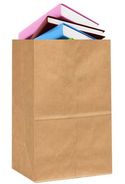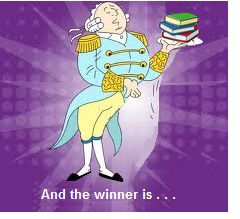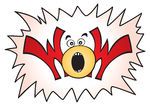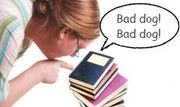Blogging & Musing...

Overheard at a party:
"What do you do?" he asks.
"I'm a writer," she says.
"Would I have heard of you?"
So she tells him her name.
No recognition.
"I write about families, marriage, sex, and desire," she adds.
"Oh, wait,"he says. "Lemme get my wife—SHE READS THOSE KIND OF BOOKS."
True story as told by author Meg Wolitzer in a NY Times Book Review essay. Wolitzer is a fine author with a string of highly regarded books to her name.
Her beef isn't that the man didn't know her name (she's not a celebrity writer) it's that he's a stand-in for most male readers, who don't value novels about marriage and family.
But then neither do the literati, Wolitzer argues, who typically ignore "relationship books"—unless those books are written by men.
She points to the shower of FAME & ACCLAIM poured down on Jeffrey Eugenides for The Marriage Plot and Jonathan Franzen for both Corrections and Freedom—all books centered around love, marriage, and family. The two authors romp in the same territory as female authors, but they get all the kudos.
Remember the dust-up between Oprah and Jonathan Franzen? In 2001 Oprah selected Corrections as one of her book club picks, but Franzen demurred… with an unfortunate comment: if his book became An Oprah Selection, no man—NO MAN!!!—would touch it. Oprah withdrew her Seal of Approval (only to bestow it 10 years later for Franzen's 2011 novel, Freedom).
I've written about this subject before, and shame on me. I was TIRED of all those intimate portraits of troubled families—you're always waiting for the next SHOE TO DROP… then the next… and the next …and eveyone's miserable …all the time. Men seem to use a larger canvas, resulting in books with more heft.
I feel like a traitor to my sex… especially because Meg Wolitizer reminded us of female authors who explore some daring territory:
—Jennifer Egan (A Visit by the Goon Squad)
—Karen Russell (Swamplandia!)
—Tea Obreht (The Tiger's Wife). Let's also add…
—A.S. Byatt (everything)
—Hilary Mantel (Wolf Hall and Bring Up the Bodies)
—Anne Patchett (State of Wonder)
—Zadie Smith (White Teeth)… And all that's just for starters.
Anyway, do read Meg Wolitizer's piece. It's thought provoking—with lots to talk about for any book group, especially a co-ed club.
 Imagine this: you're staying at a swank hotel in New York City, you're drinking and dining and hobnobbing with literary luminaries, and you receive a giftbag...like the ones handed out at kiddie birthday parties. Only not like them.
Imagine this: you're staying at a swank hotel in New York City, you're drinking and dining and hobnobbing with literary luminaries, and you receive a giftbag...like the ones handed out at kiddie birthday parties. Only not like them.
Your giftbag contains 12 books...delivered to your hotel room...and selected by a Pulitizer Prize winning author. For you. All for you. Oh! Happy daze, happy daze!
Such is the fate of the Poor Unfortunates who participated in the PEN Festival of International Literature starting April 30, 2012. The reigning Pulitzer winner, by the way, is still Jennifer Egan for A Visit from the Goon Squad. She was invited to select the books for the giftbag—here's what she chose...and why:
Emma by Jane Austen
Politics masquerading as matrimony. Austen was a mathematician of social interaction, and her novels are impossibly, preposterously good. Emma happens to be my favorite.
The Image by Daniel J. Boorstin
In 1961, before the Vietnam War was close to being televised, Boorstin identified...a longing for authenticity that naturally results from increased mediation of human experience. His observations hold eerily true even in the era of Facebook and YouTube.
Don Juan by Lord Byron
Who can resist an epic poem in which the protagonist gets shipwrecked, hides in a harem (and then is chosen by the sultan for an evening of pleasure), has a fling with Catherine the Great, and endless other romps—all narrated in Byron's slouchy, sinuous poetry?
Underworld by Don Delillo
My favorite American novel of the past 25 years. A gigantic vision of the Cold War and its aftermath, in which DeLillo manages to be sweeping, intimate, political, hilarious, and sad.
Middlemarch by George Elliot
A quintessentially swaggering 19-century English novel, thrillingly attentive to a sweep of diverse characters, and impossible to put down.
Invisible Man by Ralph Ellison
A surreal tale that exposes the ravages of racial persecution, yet ultimately subsumes them in a meditation on identity and transformation, whose proportions are nothing short of mythic.
The Transit of Venus by Shirley Hazzard
Utterly unique: a flexible, sharply written, wide-ranging story that encompasses the life of a young Australian woman who comes to England.
The Golden Notebook by Dorris Lessing
An epic, experimental yet utterly human work that manages to fuse a political vision (disillusionment with communism) with a social one (women, men, and the collisions between them).
Good Morning, Midnight by Jean Rhys
Tough, bleak, and deeply atmospheric. Rhys wrests a gripping--even phantasmagoric--narrative from the solitary perambulations of an alcoholic woman in Pais.
Tristam Shandy by Laurence Sterne
One of the first novels in English...and a bouyant, postmodern romp. A heart reminder of the power,malleability, and deep playfulness of the novel form.
The House of Mirth by Edith Wharton
Tragic in the classical sense, yet also hilarious, nuanced, and socially astute; the novel's cool assessment of the calculus of beauty and wealth rings true even in our radically divverent era.
Germinal by Emile Zola
My favorite reportorial 19th-century novel. A vivid story full of spectacular set pieces--like a horse being lowered into a coal mine--and also a brutal indictment of the mining industry's exploitation of its workers.
Thanks to The Daily Beast. And thanks, to my dear librarian, Lynne Schneider, at the Sewickley Public Library, for handing me the printout.
Quite a list. If you've not read them all...well, most of us haven't. They don't spring easily to mind...nor to the top of everyone's reading list. But HERE's THE QUESTION: what would you choose to be in the giftbag?
 The best Christmas stories ever, these are certainly my favorites. Count on them earning a place in your heart—and hopefully on your shelves so you can turn to them Christmas after Christmas. While most are sold as books for children, each invokes the magic of the season, no matter what age. They're for young and old alike.
The best Christmas stories ever, these are certainly my favorites. Count on them earning a place in your heart—and hopefully on your shelves so you can turn to them Christmas after Christmas. While most are sold as books for children, each invokes the magic of the season, no matter what age. They're for young and old alike.
10 Best Christmas Reads1. The Bible, Luke 1: 26-2:40 — King James, 1611
This choice should go without saying, of course: the very first Christmas story with all the majesty of the King James Bible, the most poetic of all Bibles. Handel surely thought so. Read Luke on Christmas Eve and listen to The Messiah.
2. The Best Christmas Pageant Ever — Barbara Robinson, 1972
The worst kids in the whole world take over the church Christmas pageant—to everyone's horror. But they end up—to everyone's amazement—revealing deeper truths about the very first Christmas. This story is so beloved that publishers have issued a picture book, two teacher guides and a play script. There's even a 1983 TV movie version. But read the book...of course! Delightful, laugh-out-loud shenanigans for kids and adults. (Paperback, 128 pp.)
3. A Christmas Carol — Charles Dickens, 1843; illustrated by P.J. Lynch, 2006
Almost everyone knows the tale of the original Scrooge and his awakening to the true spirit of Christmas. But this version of Dickens' classic is stunning—a real standout. P.J. Lynch's soft palate enhances the text with hauntingly beautiful illustrations. Do spring for the hardcover edition—it's a treasure, a book to keep forever. (Hardcover, 160pp., 9.3 x 7.8 x 1 inches.)
4. A Christmas Memory — Truman Capote, 1956
Capote's endearing account of his growing up years in rural Alabama and one Christmas spent with a favorite 60-ish spinster cousin. The two share adventures as they prepare an honest-to-goodness "handmade" Christmas in the midst of the Depression's scarcity. Use the ISBN number below to find the 1996 hardcover, Modern Library edition, which contains two other fine holiday stories. It's a wonderful, wonderful book. (ISBN: 9780679602378)
5. Letters from Father Christmas — J.R.R. Tolkien, 1976 (1st publication)
From 1920 through 1943, Tolkien "mailed" his children handwritten letters from Father Christmas recounting Santa's adventures and misadventures in the North Pole. This 2004 version, in addition to the full printed text, features Tolkien's own illustrations, as well as reprints of the letters and envelopes in his playful, wispy script. The envelopes are affixed with a hand-drawn Polar stamp. Exquisite to behold and magical to read. (Paperback, 111 pp., 9,7 x 7.5 x 0.3 inches.)
6. The Night Before Christmas — Clement J. Moore, 1823
How could we even get through the holiday without Dasher and Dancer and Prancer and Vixen? Here are my two favorite versions, each enhanced by a top children's illustrator:
- Charles Santore, 2011—rich, sumptuous, and traditional—with a stunning 4-page center fold-out that will catch your breath. A gorgeous edition.
- Bruce Whatley, 1994—vibrant and quirky, with illustrations that jump off the page. The father-narrator is this version's central character as he rediscovers a part of his childhood. Yet it's the reindeer with their wide-eyed abandon steal who the show (Cover and Amazn link, right).
(All hardcover; average size: 44 pp., 12 x 10.5 x 0.5 inches.)
7. The Polar Express — Chris Van Allsburg, 1985
For its sheer imagination and the luxurious quality of its illustrations, Polar Express became a Christmas classic the instant it hit the bookstores. Yes, there's a movie, but get the book instead—about a young boy who takes a magical ride to the North Pole. Gorgeous, simply gorgeous. Although meant as a young children's picture book, adults will find it hard to put down. (Hardcover, 32 pp., 9.2 x 11.5 x 0.5 inches.)
8. Stopping by Woods on a Snowy Evening — Robert Frost, 1956; illustrated by Susan Jeffers, 1978
Though Frost didn't write "Stopping by Woods" as a holiday poem, this lavishly illustrated version of his beloved classic evokes the warmth of the season while managing to maintain (for the most part) the original's eery, haunting quality. Purists may object to its semi-sweet tone, but it's a beautiful introduction to Frost—a slender book to be read over and over, suitable for adults and children. (Hardcover, 32 pp.; 8.6 x 7.3 x 0.4 inches.)
9. The Stupidest Angel — Christopher Moore, 2004
If you've tired of all the sentimentality and need a bracing dash of irreverence, here's the most irreverent Christmas book around—an angel in search of a miracle and a young boy who's sure he's witnessed someone offing Santa. You've got to love Moore to appreciate his wacky humor, off-color language, and off-beat characters. Christmas mayhem—silly at times, even sophomoric, often hilarious, and always fun. This one is not for kids. (Paperback, 320 pp.)
10. Twelve Days of Christmas — Illustrated by Jan Brett, 1997
This illustrated version of the 18th-century English Christmas carol should be in your hands—now! Jan Brett's illustrations are so whimsical, colorful and rich in detail you'll find yourself transported to another world—a world of pure, sumptuous delight. There's also a miniature 6 x 5-inch version, but go for the standard. Why skimp on something so lovely? (Hardcover, 32 pp., 10 x 8 x 0.2 inches.)
I've left out a lot of good ones, many of them novels (John Grisham's Skipping Christmas, Jason Wright's Christmas Jars). I've also omitted Jean Shepherd's Christmas Story, which is actually a novelization of separate stories, not all holiday oriented, that were collated for the film. I've not read the "book," but I love the movie.
For me, though, the real magic of Christmas is found in stories that appeal to children, as well as adults...ones to be read again and again. That, I think, explains most of my choices.
We'd love to hear about your favorites. Let us know on our Facebook page which Christmas stories you love.
 A literary spat that broke out some 30 years ago tickled my funny bone after reading about it in today's New York Times Book Review section. But the article also got me to thinking about what we in book clubs read.
A literary spat that broke out some 30 years ago tickled my funny bone after reading about it in today's New York Times Book Review section. But the article also got me to thinking about what we in book clubs read.
Thirty years ago, authors and publishers split ranks over the National Book Awards—differing on what kind of books should win.
On one side stood the panel of authors and critics who selected the winners. They championed books of high literary merit, based on prose and philosophical insight. Unfortunately, those books don't tend to be big sellers.
On the other side stood publishers who accused the panel of being elite insiders. Why not select big sellers, books that actually make money...just in case anyone forgot that publishing's a business?
I'm not taking sides here, but it got me to thinking about the books we select in our book clubs. I've taken issue on a number of occasions with those who think book clubs read drivel or those who refer to us as a gaggle of geese.
While I don't think most of us tackle a steady diet of difficult "literary" works, and while occasionally we do chose lighter fare, book clubs primarily look for works that engage the reader—compelling characters, solid plotting, and some darn good writing. We also like works that take on issues that divide humanity and do harm to body and soul.
We also want books to be accessible. Finally, they should lead to lively discussions—because conversations about literature can open eyes and change minds. Actually, when you think about it, all those requirements make a pretty tall order for any author.
 It's easy (for me, at least) to talk about books and writers that disappoint, so maybe it's time to talk about the ones that knock your socks off, the writers that astonish you with their prose. Not just good writing, or even really good writing, but extraordinary writing.
It's easy (for me, at least) to talk about books and writers that disappoint, so maybe it's time to talk about the ones that knock your socks off, the writers that astonish you with their prose. Not just good writing, or even really good writing, but extraordinary writing.
The books I've listed below aren't necessarily my favorites, though some are; they're not always heavy on plot, and a number are interrelated short stories—not my particular structure of choice.
Mainly, they're impressive for the sheer beauty of their prose and vision—the kind of writing that elicits a shiver and a..."how did they do that?" Some are fairly new releases, others have been around for a couple of years. Here's my list...so far.
| Kevin Brockmeier | — | The Illumination |
| Jennifer Egan | — | A Visit from the Goon Squad * |
| Louise Erdrich | — | A Plague of Doves |
| Jeffrey Eugenides | — | Middlesex |
| Jonathan Franzen | — | Freedom * |
| Nicole Krauss | — | Great House |
| David Mitchell | — | A Thousand Autumns of Jacob de Zoet * and Cloud Atlas |
| Elizabeth Strout | — | Olive Kitteridge * |
| Zadie Smith | — | On Beauty * |
| (* Click on title for Reading Guide; click on * for our Book Review.) | ||
Of course, there are plenty of wonderful writers...really, really good ones. Some of my favorites are Kate Atkinson, Margaret Atwood (she probably should be on the superlative list), Anita Brookner, Michael Chabon, Jonathan Safran Foer, Elinor Lipman, China Mieville, Ann Patchett, Richard Russo, and Colm Toibin.
Let us know if you've got some superlatives...or some all-time favorites.
 Some books make you wonder why the author bothered...and then make you wonder why YOU'RE bothering. Do you continue with a disappointing book...or put it down?
Some books make you wonder why the author bothered...and then make you wonder why YOU'RE bothering. Do you continue with a disappointing book...or put it down?
I've done both recently. I picked up Jaimy Gordon's Lord of Misrule on the basis of its solid reviews. But Gordon's prose felt so clogged and overworked it was offputting. It turns out Gordon is a professor of writing, which maybe is why the book feels a bit like a writing-class exercise. I love dense, rich prose, but not.... Well, anyway, I put the book aside.
Then I picked up Sara Gruen's newest, Ape House, in which a family of apes—who communicate using American Sign Language—eventually become stars in their own reality tv show. Just think of the possibilities! But Gruen's prose is thin and screen-writerish. And her apes turn out to be a lot more interesting than her humanoids.
I finished Gruen's book, though—thinking there might be a payoff. Besides it wasn't painful to read. And there is a sort of pay-off at the end, predictable but sweet.
*Added later...For a truly great read about apes and people, try The Evolution of Bruno Littlemore (sorry, no reading guide)...it's brilliant, funny, and disturbing.
Questions for Book Clubs
What do you do with disappointing books...especially if one is your book club selection? Which ones have disappointed...and why?

Lately, I've been struck by something strange: my growing preference for male writers. I'm a little tired of Venus, which is hard for me to admit...what with being a girl.
But after reading a lot of female authors recently, I find myself bored with their focus on the intimate—the bird's eye view into relationships and family—waiting for the shoe to drop, the relationships to explode, tragedy to strike, and a general mess to be made of everything. I'm always worried how it all gets cleaned up.
I'm thinking of authors like Sue Miller, Jodi Picoult, Anne Tyler, Alice Hoffman, Jennifer Weiner, Marilynne Robinson. These are incredibly talented writers; they're wonderful. It's just that....
Men seem to write on a larger scale; even the personal is painted on a broader canvas, sometimes of near-epic proportions. I'm thinking of David Mitchell's The Thousand Autumns of Jacob de Zoet ... Jeffrey Eugenidies Middlesex...David Wroblewski's Edgar Sawtelle......Phlip Roth's The Human Stain or American Pastoral.
After finishing one of those novels, I feel as if I've been part of something grand, something vast and far beyond my day-to-day perception of life. There's a thrill in that.
But now, in the very act of putting pen to paper (or finger to key), I'm starting think of all the exceptions: Hilary Mantel's Wolf Hall is of an era, and Louise Erdrich's Plague of Doves is mythic. Both Richard Russo and Chris Bohjalian write with penetrating intimacy. So...well, there you go. I've proven nothing.
Still, the issue recalls an earlier post in which I asked the same question: Do men and women write differently? The question at the time was spurred by Liesl Schillinger, who wrote in a New York Times review of Domestic Disturbances:
While the voice and mood of the novel are masculine, clinical and objective . . . the book’s descriptions of colors, smells, clothing and bodies show feminine perception.
So...if Liesl can say something like that...maybe I'm not nuts.
Site by BOOM
![]()
LitLovers © 2024









